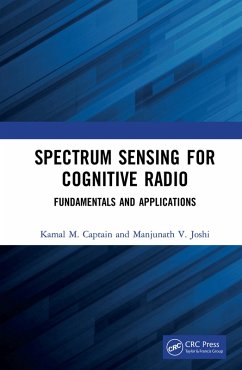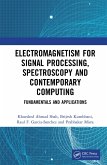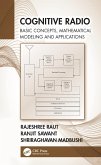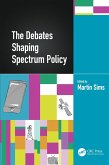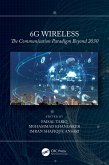Kamal M. Captain, Manjunath V. Joshi
Spectrum Sensing for Cognitive Radio (eBook, PDF)
Fundamentals and Applications
47,95 €
47,95 €
inkl. MwSt.
Sofort per Download lieferbar

24 °P sammeln
47,95 €
Als Download kaufen

47,95 €
inkl. MwSt.
Sofort per Download lieferbar

24 °P sammeln
Jetzt verschenken
Alle Infos zum eBook verschenken
47,95 €
inkl. MwSt.
Sofort per Download lieferbar
Alle Infos zum eBook verschenken

24 °P sammeln
Kamal M. Captain, Manjunath V. Joshi
Spectrum Sensing for Cognitive Radio (eBook, PDF)
Fundamentals and Applications
- Format: PDF
- Merkliste
- Auf die Merkliste
- Bewerten Bewerten
- Teilen
- Produkt teilen
- Produkterinnerung
- Produkterinnerung

Bitte loggen Sie sich zunächst in Ihr Kundenkonto ein oder registrieren Sie sich bei
bücher.de, um das eBook-Abo tolino select nutzen zu können.
Hier können Sie sich einloggen
Hier können Sie sich einloggen
Sie sind bereits eingeloggt. Klicken Sie auf 2. tolino select Abo, um fortzufahren.

Bitte loggen Sie sich zunächst in Ihr Kundenkonto ein oder registrieren Sie sich bei bücher.de, um das eBook-Abo tolino select nutzen zu können.
The text examines basic spectrum sensing algorithm for narrowband spectrum sensing to the more advanced wideband spectrum sensing in a single volume. It will be an ideal reference text for graduate students and academic researchers in the field of electrical engineering, electronics engineering and remote sensing.
- Geräte: PC
- ohne Kopierschutz
- eBook Hilfe
- Größe: 7.83MB
Andere Kunden interessierten sich auch für
![Electromagnetism for Signal Processing, Spectroscopy and Contemporary Computing (eBook, PDF) Electromagnetism for Signal Processing, Spectroscopy and Contemporary Computing (eBook, PDF)]() Khurshed Ahmad ShahElectromagnetism for Signal Processing, Spectroscopy and Contemporary Computing (eBook, PDF)47,95 €
Khurshed Ahmad ShahElectromagnetism for Signal Processing, Spectroscopy and Contemporary Computing (eBook, PDF)47,95 €![Cognitive Radio (eBook, PDF) Cognitive Radio (eBook, PDF)]() Rajeshree RautCognitive Radio (eBook, PDF)54,95 €
Rajeshree RautCognitive Radio (eBook, PDF)54,95 €![Wireless Communication with Artificial Intelligence (eBook, PDF) Wireless Communication with Artificial Intelligence (eBook, PDF)]() Wireless Communication with Artificial Intelligence (eBook, PDF)50,95 €
Wireless Communication with Artificial Intelligence (eBook, PDF)50,95 €![Antennas for Industrial and Medical Applications with Optimization Techniques for Wireless Communication (eBook, PDF) Antennas for Industrial and Medical Applications with Optimization Techniques for Wireless Communication (eBook, PDF)]() Antennas for Industrial and Medical Applications with Optimization Techniques for Wireless Communication (eBook, PDF)54,95 €
Antennas for Industrial and Medical Applications with Optimization Techniques for Wireless Communication (eBook, PDF)54,95 €![The Debates Shaping Spectrum Policy (eBook, PDF) The Debates Shaping Spectrum Policy (eBook, PDF)]() The Debates Shaping Spectrum Policy (eBook, PDF)46,95 €
The Debates Shaping Spectrum Policy (eBook, PDF)46,95 €![6G Wireless (eBook, PDF) 6G Wireless (eBook, PDF)]() 6G Wireless (eBook, PDF)103,95 €
6G Wireless (eBook, PDF)103,95 €![Cognitive Radio (eBook, PDF) Cognitive Radio (eBook, PDF)]() Cognitive Radio (eBook, PDF)46,95 €
Cognitive Radio (eBook, PDF)46,95 €-
-
-
The text examines basic spectrum sensing algorithm for narrowband spectrum sensing to the more advanced wideband spectrum sensing in a single volume. It will be an ideal reference text for graduate students and academic researchers in the field of electrical engineering, electronics engineering and remote sensing.
Dieser Download kann aus rechtlichen Gründen nur mit Rechnungsadresse in A, B, BG, CY, CZ, D, DK, EW, E, FIN, F, GR, HR, H, IRL, I, LT, L, LR, M, NL, PL, P, R, S, SLO, SK ausgeliefert werden.
Produktdetails
- Produktdetails
- Verlag: Taylor & Francis eBooks
- Seitenzahl: 256
- Erscheinungstermin: 30. Dezember 2021
- Englisch
- ISBN-13: 9781000472035
- Artikelnr.: 63152221
- Verlag: Taylor & Francis eBooks
- Seitenzahl: 256
- Erscheinungstermin: 30. Dezember 2021
- Englisch
- ISBN-13: 9781000472035
- Artikelnr.: 63152221
- Herstellerkennzeichnung Die Herstellerinformationen sind derzeit nicht verfügbar.
KAMAL M. CAPTAIN:
Dr. Kamal M. Captain received his Ph.D. in the area of Spectrum Sensing for Cognitive
Radio from Dhirubhai Ambani Institute of Information and Communication
Technology (DAIICT), Gandhinagar, India. Before this, he completed his M.Tech
in Communication Systems from Sardar Vallabhbhai National Institute of Technology
(SVNIT) and B.E degree in Electronics and Communication Engineering from
Veer Narmad South Gujarat University (VNSGU), Surat, Gujarat, India. He is currently
serving as an assistant professor at Sardar Vallabhbhai National Institute of
Technology (SVNIT), Surat, Gujarat, India. Prior to joining SVNIT, he served as a
senior engineer (signal processing) at eInfochips, Ahmedabad, India. He has been
involved in active research in the areas of cognitive radio, wireless communication,
signal processing, and machine learning and has several journals and international
conference papers, including IEEE Transactions. He has also served as a reviewer
for IEEE Transactions, letters, and top tier conferences.
MANJUNATH V. JOSHI:
Prof. Manjunath V. Joshi received the B.E. degree from the University of Mysore,
Mysore, India, and the M.Tech. and Ph.D. degrees from the Indian Institute of Technology
Bombay (IIT Bombay), Mumbai, India. He is currently serving as a Professor
and and Dean Research and Development with the Dhirubhai Ambani Institute
of Information and Communication Technology, Gandhinagar, India. He has been
involved in active research in the areas of Signal and Image Processing, Cognitive
Radio, Computer Vision, and Machine Learning and has several publications in quality
journals and conferences. He has co-authored four books entitled Motion-Free
Super Resolution (Springer, New York-2005), Digital Heritage Reconstruction using
Super-resolution and Inpainting (Morgan and Claypool-2016), Regularization in Hyperspectral
Unmixing (SPIE Press-2016), and the book entitled Multi-resolution Image
Fusion in Remote Sensing (Cambridge University Press, UK-2019). Currently,
he is contributing as a co-author of a book to be published by Springer in remote
sensing, where seven positive reviews have been received. So far, nine Ph.D. students
have been graduated under his supervision. Dr. Joshi was a recipient of the
Outstanding Researcher Award in Engineering Section by IIT Bombay in 2005 and
the Dr. Vikram Sarabhai Award for 2006-2007 of information technology constituted
by the Government of Gujarat, India. He served as a Program Co-Chair for the 3rd
ACCVWorkshop on E-Heritage, 2014, held in Singapore. He has also served as Visiting
Professor at IIT Gandhinagar and IIIT Vadodara. He has visited Germany, Italy,
France, Hong Kong, the USA, Canada, South Korea, Indonesia and contributed to
research in his area of expertise.
Dr. Kamal M. Captain received his Ph.D. in the area of Spectrum Sensing for Cognitive
Radio from Dhirubhai Ambani Institute of Information and Communication
Technology (DAIICT), Gandhinagar, India. Before this, he completed his M.Tech
in Communication Systems from Sardar Vallabhbhai National Institute of Technology
(SVNIT) and B.E degree in Electronics and Communication Engineering from
Veer Narmad South Gujarat University (VNSGU), Surat, Gujarat, India. He is currently
serving as an assistant professor at Sardar Vallabhbhai National Institute of
Technology (SVNIT), Surat, Gujarat, India. Prior to joining SVNIT, he served as a
senior engineer (signal processing) at eInfochips, Ahmedabad, India. He has been
involved in active research in the areas of cognitive radio, wireless communication,
signal processing, and machine learning and has several journals and international
conference papers, including IEEE Transactions. He has also served as a reviewer
for IEEE Transactions, letters, and top tier conferences.
MANJUNATH V. JOSHI:
Prof. Manjunath V. Joshi received the B.E. degree from the University of Mysore,
Mysore, India, and the M.Tech. and Ph.D. degrees from the Indian Institute of Technology
Bombay (IIT Bombay), Mumbai, India. He is currently serving as a Professor
and and Dean Research and Development with the Dhirubhai Ambani Institute
of Information and Communication Technology, Gandhinagar, India. He has been
involved in active research in the areas of Signal and Image Processing, Cognitive
Radio, Computer Vision, and Machine Learning and has several publications in quality
journals and conferences. He has co-authored four books entitled Motion-Free
Super Resolution (Springer, New York-2005), Digital Heritage Reconstruction using
Super-resolution and Inpainting (Morgan and Claypool-2016), Regularization in Hyperspectral
Unmixing (SPIE Press-2016), and the book entitled Multi-resolution Image
Fusion in Remote Sensing (Cambridge University Press, UK-2019). Currently,
he is contributing as a co-author of a book to be published by Springer in remote
sensing, where seven positive reviews have been received. So far, nine Ph.D. students
have been graduated under his supervision. Dr. Joshi was a recipient of the
Outstanding Researcher Award in Engineering Section by IIT Bombay in 2005 and
the Dr. Vikram Sarabhai Award for 2006-2007 of information technology constituted
by the Government of Gujarat, India. He served as a Program Co-Chair for the 3rd
ACCVWorkshop on E-Heritage, 2014, held in Singapore. He has also served as Visiting
Professor at IIT Gandhinagar and IIIT Vadodara. He has visited Germany, Italy,
France, Hong Kong, the USA, Canada, South Korea, Indonesia and contributed to
research in his area of expertise.
1. Fundamentals of Probability Theory. 2. Introduction. 3. Literature
Review. 4. Energy Detection based Spectrum Sensing Over Generalized Fading
Model. 5. Generalized Energy Detector in the Presence of Noise Uncertainty
and Fading. 6. Diversity for Wideband Spectrum Sensing Under Fading. 7.
Cooperative Wideband Spectrum Sensing. 8. Conclusions and Future Research
Directions. 9. Appendix A Appendix for Chapter 1. 10. Appendix B Appendix
for Chapter 4. 11. Appendix C Appendix for Chapter 5. 12. Appendix D
Appendix for Chapter 6. 13. Appendix E Some Special Functions. 14.
References.
Review. 4. Energy Detection based Spectrum Sensing Over Generalized Fading
Model. 5. Generalized Energy Detector in the Presence of Noise Uncertainty
and Fading. 6. Diversity for Wideband Spectrum Sensing Under Fading. 7.
Cooperative Wideband Spectrum Sensing. 8. Conclusions and Future Research
Directions. 9. Appendix A Appendix for Chapter 1. 10. Appendix B Appendix
for Chapter 4. 11. Appendix C Appendix for Chapter 5. 12. Appendix D
Appendix for Chapter 6. 13. Appendix E Some Special Functions. 14.
References.
1. Fundamentals of Probability Theory. 2. Introduction. 3. Literature
Review. 4. Energy Detection based Spectrum Sensing Over Generalized Fading
Model. 5. Generalized Energy Detector in the Presence of Noise Uncertainty
and Fading. 6. Diversity for Wideband Spectrum Sensing Under Fading. 7.
Cooperative Wideband Spectrum Sensing. 8. Conclusions and Future Research
Directions. 9. Appendix A Appendix for Chapter 1. 10. Appendix B Appendix
for Chapter 4. 11. Appendix C Appendix for Chapter 5. 12. Appendix D
Appendix for Chapter 6. 13. Appendix E Some Special Functions. 14.
References.
Review. 4. Energy Detection based Spectrum Sensing Over Generalized Fading
Model. 5. Generalized Energy Detector in the Presence of Noise Uncertainty
and Fading. 6. Diversity for Wideband Spectrum Sensing Under Fading. 7.
Cooperative Wideband Spectrum Sensing. 8. Conclusions and Future Research
Directions. 9. Appendix A Appendix for Chapter 1. 10. Appendix B Appendix
for Chapter 4. 11. Appendix C Appendix for Chapter 5. 12. Appendix D
Appendix for Chapter 6. 13. Appendix E Some Special Functions. 14.
References.
